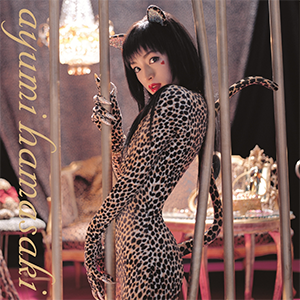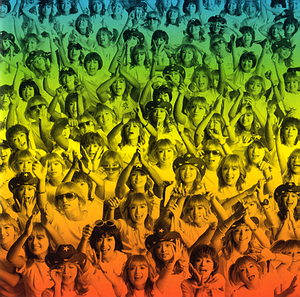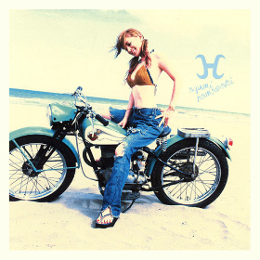
I Am... is the fourth studio album by Japanese recording artist Ayumi Hamasaki. It was released on January 1, 2002 by Avex Trax and was distributed throughout Asia in both physical and digital formats. Hamasaki enlisted long-time collaborator Max Matsuura to assist with the album's creation, and was inspired by the events of the September 11, 2001 attacks to emphasise lighter themes in contrast to her previous work.

A Song for ×× is the debut studio album by Japanese singer Ayumi Hamasaki, released on New Year's Day 1999 by Avex Trax. It was entirely written by Hamasaki herself, while the production was handled by Japanese musician Max Matsuura. Primarily a pop rock album, it features musical composition and arrangements by Yasuhiko Hoshino, Mitsuru Igarashi of Every Little Thing fame, and others. In this album, Hamasaki wrote about her confusion and uncertainty about life, expressed her expectations and hopes for the future, and expressed her gratitude to the fans who love her.

Loveppears is the second studio album by Japanese singer Ayumi Hamasaki. It was released on November 10, 1999 by Avex Trax, ten months after her debut album, A Song for xx (1999). It was additionally distributed in a variety of formats and on different dates throughout Asia. Loveppears was written entirely by Hamasaki, produced by Max Matsuura, and includes collaborations with composers such as Hal, Dai Nagao, D.A.I, Yasuhiko Hoshino, and Kazuhito Kikuchi, among others. Musically, it is a departure from her previous record and incorporates more electronic and dance sounds with elements of trance, house, J-pop, and rock. Lyrically, it explores themes of love, frustration with life, loneliness, and individualism.

Duty is the third studio album by Japanese recording artist Ayumi Hamasaki. It was released on September 27, 2000, by Avex Trax. Duty is Hamasaki's first studio album inside the 2000s decade, and her third consecutive studio album to be fully produced by Japanese musician and businessman Max Matsuura. The album's composing and arrangement was handled by several music collaborators, such as Ken Harada, Kazuhito Kikuchi, Dai Nagao, HΛL, among many others. Hamasaki contributed to the album as the primary and background vocalist, and songwriter to every song. Three different formats were released to promote the album: a standalone CD, a limited edition Playbutton, and a digital download. The cover art portray Hamasaki wearing a leopard-print catsuit.

Rainbow is the fifth studio album by Japanese recording artist Ayumi Hamasaki, released on 18 December 2002 by Avex Trax. Production of Rainbow had commenced after the release of Hamasaki's fourth studio album I Am... that January; All lyrics were written by Hamasaki, and Japanese producer Max Matsuura returned to produce the album. The album was Hamasaki's first to feature conversational English lyrics, where in her previous works she had only used single words.

"Carols" is the thirty-fourth single released by Japanese recording artist Ayumi Hamasaki. It was released on September 29, 2004, by Avex Trax. It was released on the same day as her ARENA TOUR 2003~2004 A DVD. "Carols" was used as the Panasonic Digital Camera "LUMIX FX7" CM song. It was the last single to be released from her sixth studio album, My Story (2004).

Inspire is the thirty-third single released by Japanese recording artist Ayumi Hamasaki. It was released on July 28, 2004, by Avex Trax. "Inspire" was used as the image song for a Fuji TV special about the Guggenheim Museum in New York as well as a tie-in for Avex auditions 2004. The B-side "Game" was used as the Panasonic 700MD CM song. This was her first release in about 4 months since her previous single, "Moments." It was released in two formats; "CD only" and "CD+DVD". The single was her last to be released in CCCD format. Both songs were featured on the album My Story, which came out in December that same year.

"Moments" is the thirty-second single released by Japanese recording artist Ayumi Hamasaki and was her first to be offered in both CD and CD+DVD versions. It was released on March 31, 2004, by Avex Trax. "Moments" was the first single in 2004 released by Hamasaki and was the lead single to her sixth studio album My Story (2004). "Moments" was used as the KOSÉ "VISÉE" CM song. This work marked her sixth appearance in the NHK Kohaku Uta Gassen held later the same year.

"Surreal" is a song by Japanese recording artist Ayumi Hamasaki, taken from her third studio album Duty (2000). It was written by Hamasaki and produced by Max Matsuura. The song is a rock with elements of alternative rock. "Surreal" describes Hamasaki's madness and sense of confusion, while the themes of "Surreal" are based on Hamasaki's concept of loneliness, chaos, confusion, and the burden of her responsibilities, aimed mostly toward her public image as a recording artist. It was released as the fourth single from the album on 27 September 2000 by Avex Trax and Avex Taiwan.

(Miss)understood is the seventh studio album by Japanese singer-songwriter Ayumi Hamasaki. It was released on New Year's Day 2006, by Avex Trax. Hamasaki acted as the album's sole lyricist, as she had on all of her preceding albums. (Miss)understood marked new musical directions for Hamasaki: she explored new influences such as funk and used gospel choruses in some of the songs, foreign to her previous works. This was the result of her having heard compositions by Geo from the German-based pop music project Sweetbox and asking him for his works. Subsequently, Hamasaki rewrote the lyrics entirely to fit (Miss)understood.

"Far Away" is a song recorded by Japanese recording artist Ayumi Hamasaki for her third studio album, Duty (2000). It was written by Hamasaki, while production was handled by Max Matsuura. It premiered on May 17, 2000, as the second single from the album. The song is part of a trilogy from Duty; the other two singles being "Vogue" and "Seasons".

"Seasons" is a song by Japanese recording artist Ayumi Hamasaki for her third studio album, Duty (2000). It was written by Hamasaki, while production was handled by Avex Trax chairman Max Matsuura. It premiered on June 7, 2000, as the third single from the album. The song is the final part of a trilogy from Duty; the other two singles from the trilogy being "Vogue" and "Far Away".

"Audience" is a song by Japanese recording artist Ayumi Hamasaki from her third studio album Duty (2000). It was released as the album's fifth and final single on 1 November 2000 by Avex Trax. Hamasaki wrote the track and Max Matsuura Lewis produced it. Dai Nagao and HΛL composed both the single and album version. The single artwork was shot by Japanese photographer Toru Kumazawa and features duplicate clones of Hamasaki, resembling an audience. Musically, "Audience" is a dance–pop and disco song.

"M" is the nineteenth single by Japanese recording artist Ayumi Hamasaki. "M" serves as the lead single to her first greatest hits album A Best (2001) and her fourth studio album I Am... (2002). The track marked Hamasaki's increased creative control over her music, as it was the first song she composed, under the pen name "Crea". The lyrics of "M" are about Hamasaki talking to Maria, or also possibly to Mary Magdalene, hence the title "M".

H is an EP by Japanese recording artist Ayumi Hamasaki, featuring songs later included on her fifth studio album Rainbow (2002). The EP contains the songs "Independent," "July 1st" and "Hanabi," all written and co-composed by Hamasaki, alongside composer Dai Nagao and producer Max Matsuura. Hamasaki had written and recorded the three songs when she was still hurt and influenced by the events of the September 11 attacks and the completion of her fourth studio album I Am... (2002).

A Best 2 is a two-part greatest hits album by Japanese singer Ayumi Hamasaki. Both albums, titled Black and White, were released on 28 February 2007 on various formats by Avex Trax. Produced by Max Matsuura, they follow Hamasaki's compilation album A Best, which was released in March 2001. A Best 2 are concept albums, with Black focusing on darker and more serious tones and White on lighter and more upbeat themes. The albums contain 31 songs, including an unreleased track titled "Part of Me" on the Black edition, that were released between the periods of her albums I Am... (2002) and (Miss)understood (2006).

A Complete: All Singles is a greatest hits album by Japanese singer Ayumi Hamasaki. Avex Trax released it on September 10, 2008 in a variety of formats, and was created to commemorate the singer's tenth anniversary since the release of her 1998 single "Poker Face". The album is divided into three sections, each highlighting a single released by Hamasaki from her debut in 1998 to her most recent single, "Talkin' 2 Myself" in 2007. Additionally, the compilation includes two new songs: the stand-alone single "Mirrorcle World" and a re-recorded version of "Who...".

"Rule"/"Sparkle" is a double A-side single by Japanese recording artist Ayumi Hamasaki from her tenth studio album, Next Level (2009). The song was released on a CD and DVD format on February 25, 2009 as the second single from the album. With "Rule" composed by Miki Wantanabe and "Sparkle" composed by Kazuhiro Hara, both songs were written by Hamasaki and produced by long-time collaborator Max Matsuura. "Rule" was used as the international theme song for the 2009 film Dragonball Evolution.

Rock 'n' Roll Circus is the eleventh studio album by Japanese recording artist Ayumi Hamasaki. It was released on April 14, 2010, by Avex Trax. It was also released just a little over a year after her 2009 album, Next Level. Rock 'n' Roll Circus marks Hamasaki's eleventh consecutive album to be fully produced by Japanese producer and manager Max Matsuura, while she contributes to the album as the lead vocalist, background vocalist, and songwriter to all songs. Recorded in Japanese with minor phrases in English, Rock 'n' Roll Circus is a rock album with numerous musical elements such as electropop, J-pop, rock, pop ballad, and dance music.

Again is the fourth extended play by Japanese recording artist Ayumi Hamasaki from her fourteenth studio album Love Again (2013). The EP contains the songs "Wake Me Up", "Sweet Scar", "Snowy Kiss" and "Ivy", alongside remixes and instrumental versions of the original tracks. Produced by longtime collaborator Max Matsuura, Again is a pop EP.














